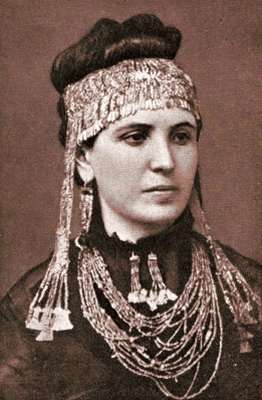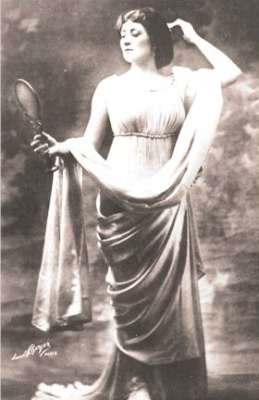
On Christmas 1890 in Piazza Carità in Naples, Italy an unknown lonely old gentleman dressed in simple attire – clearly a foreigner – while strolling with an absentminded attitude silently faints and lies down on the sidewalk; succoured by the bystanders he is rapidly transported to the nearest hospital, in vain: he passed away after two days. This elderly tourist was Heinrich Schliemann, without any shade of doubt the most legendary archaeologist of all times, the very first explorer of Troy, Tyrint and Mycenae, the discoverer of the celebrated so called Treasure of Priam and Mask of Agamemnon, the precursor of the excavations of Crete and Orchomenus. The extraordinary successful and energetic pioneer was 68 and still ready for more expeditions and quarrying. Born in North-East Germany to a underprivileged family, thanks to his indomitable tenacity, highly uncommon practical intelligence and – of course, for it is always needed – a fair dose of luck, this incredible merchant had been able before reaching forty to accumulate quite a great fortune, to retire from business and finally devote himself to the pursuit of the very dream of his childhood: to become and archaeologist and, by following the clues traceable within Homer’s masterpieces, to identify, localise and uncover the city of Ilios – which he actually did.
Being a self-made man, with inconsequential curricular studies he was apathetically scorned by the European intelligentsia and aloofly derided by the academics. Furthermore he was continuously and strenuously fighting against home and foreign bureaucracy and political intrusions. Nevertheless, supported by his remarkable determination and – of course, for it always helps – by his fathomless bank account, he finally was rewarded with great discovering achievements and received many honours. Yet, there are good reason to believe that he was in his inner nature a gloomy and murky character, inclined to sadness and altogether convinced of being unappreciated and misunderstood. This more intimate side of his temperament is indeed palpable when examining his relationships, where contradictory feelings and behaviours show the contrast between the greatly resolute successful businessman and his insecure sentimental nature.
His adolescent love Minna Meincke, a neighbour girl of better condition, got married in 1847 with someone else, while he – quite naively indeed – expected to marry her himself on his way back to Germany: as meantime working in the Netherlands and Russia he had acquired a considerable social status and significant finances. He indirectly asked her to marry him, via a friend C.E. Laué who reported him the sad outcome, which prostrated him: “But to my horror I received a month afterward the news she had just got married”
Immediately afterwards he proposed to a German young lady living in Saint Petersburg, Sophie Hekker, whose greedy father, in spite of her reluctances, was more than willing to force her to accept. However Heinrich broke the romance for a rush of jealousy and went to the USA. Later, on his way back from California he proposed again to her – and at the same time to an attorney’s daughter, Katherina Lyshin; for, being a shrewd entrepreneur, he had guessed his reiterated proposal to Sophie would have been rejected. By the way it occurred that the two prospect spouses were acquainted with each other… However, shortly after his return from San Francisco on October 7th, 1852 in Saint Isaac Cathedral of Saint Petersburg Heinrich married Katherina Lyshin, who gave him three children Serge, Natalia, Nadeshda. Nonetheless it was soon evident that Katherina did not love him at all, as he writes to a friend of his: “She enjoys to portray me to everyone as a terrible tyrant, a despot, a debauched…”
Basically she deprecated his juvenile scholar dreams and youthful intellectual attempts, despised travelling with him (during their marriage years he had visited – all by himself – several major European capitals, Egypt, Japan, India, China, Singapore…) and abhorred the idea of leaving Russia to settle down in Paris, in spite of his numerous appeals and letters: “Every night I go to theatre or conferences held by the most famous professors of the world, Touvé, Beulé, the viscount de Rougé and I could tell you stories for ten years without ever boring you…”
Knowing she loved Dresden he offered to settle down there instead of Paris, but also this offered solution was of no avail. Greedy of opulence and social ostentation, it seems she never really understood what was really important to him. Katherina, who never shared any intellectual and spiritual interests with him, slowly pushed him away in a deeper solitude and discomfort. Evidently the transformation of her husband from a highly acclaimed trader and banker to a weird amateur archaeologist, derided by the entire academic world, scantily travelling to dusty remote places and meagrely living away from the jet set and its lust and comforts was something way beyond her comprehension and acceptance. On Christmas 1868 she literally ran away from him, putting him in a deep state of consternation, as he wrote her:
You fled from home just because you knew that your poor husband was about to come back home. I had come to see you and stay with you at least one week and try to restore harmony between us, at any rate; actually I swear to God Almighty I was willing to make any kind of possible concession, I was ready to sacrifice 1 million francs to re-establish domestic peace. But how you behaved towards me! I still shiver for the dismay and the horror of your infernal conduct…. Yet, surely you never heard me utter one single bad word, even when your terrible and execrable behaviour had broken my heart…
He finally realised he could not make happy a woman who detested him and filed for divorce. Nonetheless Heinrich was stubborn in his pursuit for conjugal contentment. He confessed to a friend of his: “I strongly need to have by my side a heart that loves me”. And consequently he was contemplating, this time with the intercession of his cousin Adolph, to marry a cousin of his, Sophie Bürger: a girl he had seen only once, three years before and that apparently fancied him… Thus, to Schliemann’s businesslike line of reasoning she seemed the right one, as he explained to a friend: “human nature leads us to always esteem and love those who are more educated than us in those sciences and disciplines that we most cherish, for this reason I think I would be very happy with her…”
Yet the couple did not tie the knot – seemingly because of the large age difference. So he asked, again in his peculiar modus operandi, to his friend and highly distinguished Greek teacher Theokletos Vimpos (an Orthodox Archbishop) to find him a Greek wife endowed with the same “angelic temperament of his mother and sister”! Actually writing to his brother in law he had made a less idyllic portrayal of his intentions and expectations, bluntly stating that Greece was able to offer girls “as beautiful as the pyramids” and “as poor as rats” chasing any foreigner to escape from poverty. However, consumed merchant as he was, he placed a detailed order to Vimpos: she was supposed to be young enough to have children, amiable, enthusiast of ancient Greece art and literature, ancient history and geography, willing to accompany him in his travels and more… Surprisingly Vimpos, who likewise cousin Adolph had profited of Schliemann’s paranymph assignment to recover from some slight personal financial distress, had found him two possible prospect brides: Polyxena Giusti and Sophia Engastromenos. When Schliemann saw their two pictures Vimpos had sent him for review he commented:
As I am an old traveller I am a good judge of countenances and I can promptly describe you the character of the two girls by just examining their portraits. … Polyxena Giusti is the right age to marry me, but she is bossy, authoritarian, despotic, irritable and vengeful. I think she has developed all these faults while performing her least enviable metier of school teacher. Sophia Engastromenos, is a splendid woman, open, indulgent, gentle and good housewife, full of life and well educated.
And almost immediately showed the utmost willingness and proposed to marry her within three months, although previously asking poor Vimpos all sort of questions!:
What is Mr. Engastromenos trade? What are his possessions? How old is he and how many children he has? How many boys and girls? In particular how old is Sophia? What colour is her hair? Where does the family live in Athens? Does Sophia play the piano? Does she speak any foreign language? Which one? Is she a good housewife? Does she understand Homer and the other ancient authors? Or does she completely ignore the idiom of our ancestors? Would she consent to move to Paris and to accompany her husband through his travels to Italy, Egypt and elsewhere?
Once ascertained that all features of Sophia corresponded to his requirements and quality standards, Heinrich finally decided to propose, although with extreme tact and caution, as he wrote her:
Unfortunately, as it seems, marriages in Greece are always arranged in great haste, even only after the first meeting, and for this reason half of them dissolve within one year. My feelings repel such disastrous practice. Marriage is the most splendid of all human institutions if its sole motives are respect, love and virtue; but marriage is the most ignoble bond and the heaviest yoke if it is based on material interest or sensual pleasure. Wealth contributes to matrimonial happiness, but it does not create it by itself and the woman who would marry me only for my money, or to become a great lady in Paris, would bitterly regret to have left Greece, because she would make me and herself wretched. The woman who marries me, ought to make it because of my worth as a man.
After some more – mainly epistolary – negotiatory courting Sophia eventually responded:
Yes, my dear Heinrich, nothing would make me happier than your resolution to take ma as your spouse. If you decide to take this step, I will be grateful for my entire life and will consider you as my sole benefactor.
On September 23rd, 1869 the wedding took place. They had two children: Andromache and Agamemnon. Sophia was everything he had always wanted, beautiful, intelligent, interested in his job, apparently enjoyed helping him in his expeditions and excavations and was as enthusiastic as him about Iliad and Odyssey. But not all that glitters is gold: Sophia was also psychologically weak and slightly unbalanced, causing Heinrich a miserable family-life mixed with few sweet moments, though.. This circumstance was worsened by Schliemann’s atavic fears of giving himself to someone who did not really care about him. This highly shrewd merchant, smart investor, adventurous globetrotter and archaeologist, who in his loneliness loved to find refuge in a legendary poetical past, was deep inside very frail and vulnerable, and depressively nurtured and kept his suspicions and doubts of not being loved until his death. He wrote:
I do not deceive myself with foolish illusions. I know very well that a young and pretty girl cannot fall in love with a man like me for his looks. Because of the simple passing by of the years a man is no more physically attractive. But I’ve thought that a woman endowed with a character that perfectly harmonises with mine and enlightened by the same enthusiasm and desire for knowledge could respect me… then I dare hoping that with time she would learn to love me…
And later on he wrote her:
I suffer because of the many displeasures you give me everyday… Night and day an idea torments me: you would be happy with a young husband and maybe your compatriot…
Ultimately this unparalleled personage, who was able to achieve what perhaps anybody else would not ever dare dreaming of: success, money, adventure, travels, honours… never really uncovered what he himself considered the real treasure, as he sadly wrote:
Domestic happiness is the greatest of all earthly blessings


